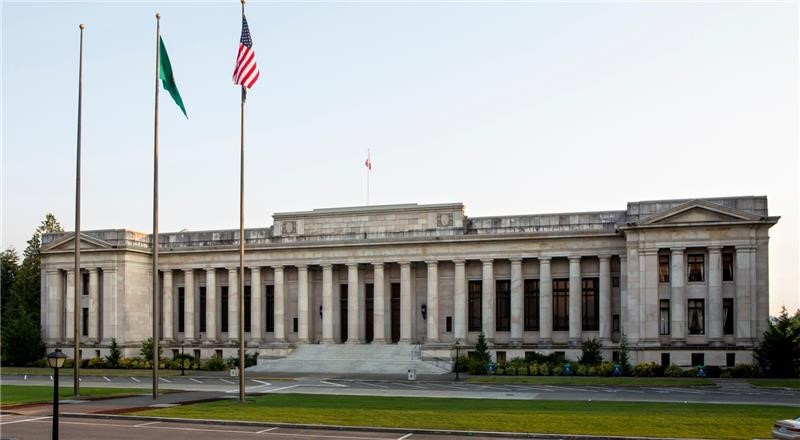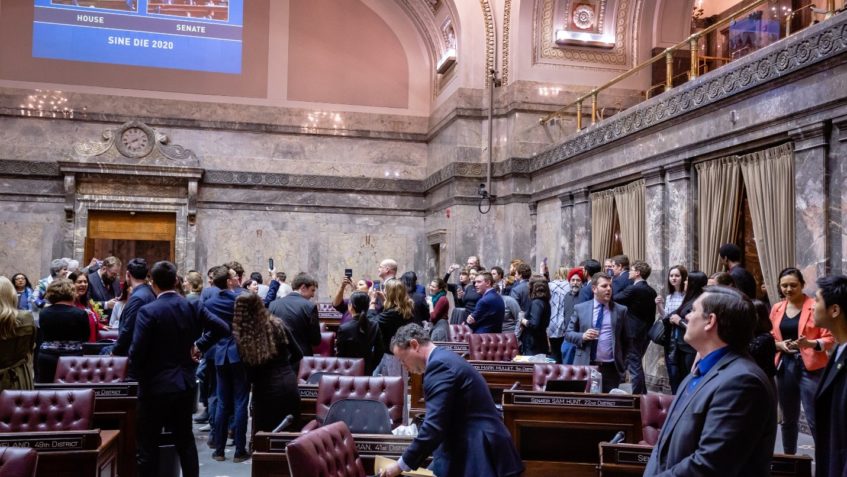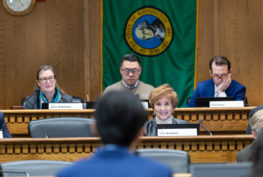Sine Die
On Sunday April 25, 2021, the Washington State Legislature will meet for its last day of the 105 day session before adjourning sine die, the final act of the Legislature. Sine die is Latin for “without a day” because the Legislature adjourns without setting a day to reconvene. We sine die when both chambers are finished with their legislative business or at midnight on the last day, whichever happens first.
At that time, the chamber doors of both bodies are opened so the President of the Senate and the Speaker of the House can see each other across the rotunda. Members, staff, and visitors gather in the wings of the chambers, and then come onto the floor with the permission of the presiding officers for the simultaneous final bang of the gavel. While this year’s festivities will take place remotely, I am looking forward to finishing up the most intense and challenging session I have experienced to date. The end of session also marks the end of my weekly newsletters; however, I will continue to send out updates periodically throughout interim. Stay tuned!
988 Hotline

Though we are just days away from the end of session, important bills are still moving through the legislature. On Monday, the Senate passed HB 1477, a bill that aims to connect people experiencing a behavioral health crisis with immediate help. The Federal Communications Commission designated 988 as the new national suicide prevention hotline number and provided a two-year transition period ending in July 2022. Introduced by Rep. Tina Orwall, HB 1477 establishes a committee to plan for implementation of the 988 crisis hotline and crisis response system enhancements.
Currently, those experiencing a behavioral health crisis have limited resources and are often referred to 911. One-in-four police shootings involving someone experiencing a behavioral health crisis. With this bill, Washington can be a leader for behavioral health and prioritize treatment for mental health over criminalization. Implementing a responsive, robust, and caring 988 system will save lives.
State v. Blake
On Feb. 25, in the State v. Blake decision, the Washington State Supreme Court declared Washington’s strict liability drug possession statue, which criminalized unintentional, unknowing possession of controlled substances, unconstitutional.
To respond to the Washington State Supreme Court decision, the Legislature put forward SB 5476, which attempts to respond to drug use and possession as an issue of public health rather than criminal justice. In its current form in the House, the bill constitutes a massive overhaul of our criminal justice and substance abuse systems. Some of the major provisions include the following, though I encourage you to read more on the bill at the link above.
- In order to be convicted of possession of a controlled substance, possession of a counterfeit substance, or possession of a legend drug, the person must have knowingly been in possession of the substance or drug.
- Possession of a controlled substance is reclassified from a class C felony to a misdemeanor, and possession of a counterfeit substance is reclassified from a class B or C felony to a misdemeanor. In cases of possession of a controlled substance, counterfeit substance, or legend drug, the prosecutor must divert a case for treatment if the alleged violation is the person’s first or second violation. On a person’s third and subsequent violations, the prosecutor is encouraged to divert the case for treatment.
- Use or delivery of drug paraphernalia is no longer a criminal offense
- Outlining alternatives to arrest for persons with mental health disorders are modified to also expressly apply to persons with substance use disorder.
- As part of basic law enforcement training, all law enforcement personnel must receive training on law enforcement interaction with persons with substance use disorders, including referral to treatment and recovery services.
- The Health Care Authority (HCA) must establish a substance use recovery services plan to implement measures that assist people with substance use disorder in accessing outreach, treatment, and recovery support services.
- The HCA must establish community-based recovery navigator programs.
- Proceeds from all infractions created in the bill must be deposited into the State v. Blake Reimbursement Account. Expenditures from the account may be used only for state and local government costs resulting from the State v. Blake decision and to reimburse individuals for legal financial obligations paid in connection with sentences that have been invalidated as a result of the decision.
Many watching this bill’s progress have expressed confusion over the Senate floor vote. Multiple floor amendments substantially changed the contents of the bill, so much so that its original sponsor voted against the bill’s passage. Though I was not pleased with its form at the time either, as it still does not fully decriminalize drug possession, I did vote in favor of passage so that the bill may continue through the legislative process and be amended further down the line. As you are reading this, new amendments are being prepared and I am hopeful I will be able to support the final product.
Washington COVID-19 Immigrant Relief Fund

If you’re an immigrant experiencing hard times because of COVID-19, and you aren’t eligible for federal financial relief or unemployment insurance, this fund is for you. Applications opened once again and will remain open from April 21 to May 21 on a first-come-first-served basis, prioritizing those in greatest need.
Apply for the Washington COVID-19 Immigrant Relief Fund and receive up to a $1,000 one-time direct payment per individual. Learn more and apply online here or by calling 1-844-724-3737.
The Immigrant Relief Fund website is available in English, Spanish, Korean, Vietnamese, Chinese, Swahili, Garifuna, Tagalog, Somali, and Hindi. Help in most languages is available through the hotline, at 1-844-724-3737. If you’d like to get the message out about the fund to your community, visit the Partner Outreach page for flyers, posters, sample social media posts, and more.
But for the video taken by a teenager…

The death of George Floyd would have been handled the way thousands of other killings by police have been handled. The initial police account told a very different story than the video revealed. And lest we forget, everything that occurred stemmed from the possibility of a counterfeit $20 bill being passed.
As a nation we watched the video of Floyd’s murder and as a nation we watched a jury in Minneapolis hand down a guilty verdict. And we breathed. Accountability – albeit for one family, and a year late.
For many, justice or even accountability is nowhere to be found. While the jury was handing down their verdict, a 16-year-old girl named Ma’Khia Bryant in Ohio called police for assistance and instead was shot and killed ten seconds after the officers stepped out of their vehicle. The impunity of police officers and the larger systems that lead to over-policing of Black bodies and other communities of color permeates every single state, and Washington is no exception. Our own communities grieve and demand accountability for the deaths of Charleena Lyles, Manuel Ellis, Kevin Peterson Jr., and others. The Washington Post database lists 175 fatal shootings by an on-duty police officer in the state of Washington since 2015. Within King County, the fatal use of force by police disproportionately occurs in South King County, which has more residents living below the poverty line and more BIPOC residents than other areas of the county. These trends only further illuminate the obligation that elected officials have to dismantle these structures.
This year, the Washington State Legislature passed SB 5055, HB 1089, SB 5259, SB 5135, HB 1088 and more on the topic of police reform. While I am glad to see progress in this form, these measures are long overdue and barely scratch the surface of the work to be done. Last summer, I asked you to hold me and my fellow legislators accountable to using our positions to change the policy these systems hide behind, and I stand by that request. We must continue to push forward, and I look forward to doing so in future sessions.


